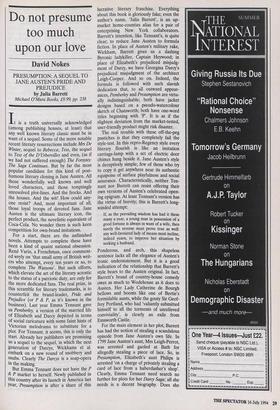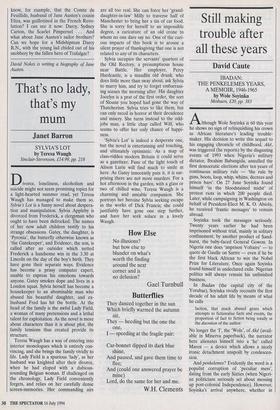Do not presume too much upon our love
David Nokes
PRESUMPTION: A SEQUEL TO JANE AUSTEN'S PRIDE AND PREJUDICE by Julia Barrett Michael O'Mara Books, £9.99, pp. 238 It is a truth universally acknowledged (among publishing houses, at least) that any well known literary classic must be in want of a sequel. Some of the more notable recent literary resurrections include Mrs De Winter, sequel to Rebecca; Tess, the sequel to Tess of the D'Urbervilles and even, (as if we had not suffered enough) The Forsytes: The Saga Continues. But by far the most popular candidate for this kind of post- humous literary cloning is Jane Austen. All those wonderfully well known and well loved characters, and those temptingly unresolved plot-lines. And the frocks. And the houses. And the wit! How could any- one resist? And, most important of all, those loyal troops of devoted fans. Jane Austen is the ultimate literary icon, the perfect product, the novelistic equivalent of Coca-Cola. No wonder there is such keen competition for own-brand imitations.
For a start, there are the unfinished novels. Attempts to complete these have been a kind of quaint national obsession. Rend Varin, a Frenchman, once comment- ed wryly on 'that small army of British writ- ers who attempt, every ten years or so, to complete The Watsons'. But such efforts, which elevate the art of the literary acrostic to the status of a patriotic duty, are only for the more dedicated fans. The real prize, in this scramble for literary trademarks, is to counterfeit the brand-leader, Pride and Prejudice (or P & P, as it's known in the business). Last year Emma Tennant gave us Pemberley, a version of the married life of Elizabeth and Darcy depicted in terms of social caricature with some faint hints of Victorian melodrama to substitute for a plot. For Tennant, it seems, this is only the start. Already her publishers are promising us a sequel to the sequel, in which the next generation of Darcys, Wickhams et al. embark on a new round of snobbery and snubs. Clearly The Darcys is a soap-opera in the making. But Emma Tennant does not have the P & P market to herself. Newly published in this country after its launch in America last Year, Presumption is after a share of this lucrative literary franchise. Everything about this book is gloriously fake; even the author's name, 'Julia Barrett', is an up- market home-counties alias for a pair of enterprising New York collaborators. Barrett's intention, like Tennant's, is quite clear; to reduce Jane Austen to formula fiction. In place of Austen's military rake, Wickham, Barrett gives us a dashing Byronic ladykiller, Captain Heywood; in place of Elizabeth's prejudiced misjudg- ment of Darcy, we have Georgina Darcy's prejudiced misjudgment of the architect Leigh-Cooper. And so on. Indeed, the formula is followed with such slavish dedication that, to all outward appear- ances, Pemberley and Presumption are virtu- ally indistinguishable; both have jacket designs based on a pseudo-watercolour sketch of Chatsworth; both have one-word titles beginning with 'P'. It is as if the slightest deviation from the market-tested, user-friendly product might risk disaster.
The real trouble with these off-the-peg pastiches is that they completely fail the style-test. In this repro-Regency style every literary flourish is like an imitation carriage-lamp with a set of electric door chimes hung beside it. Jane Austen's style is deceptively simple; few of those who try to copy it get anywhere near its authentic equipoise of surface playfulness and social assurance. Characteristically, neither Ten- nant nor Barrett can resist offering their own versions of Austen's celebrated open- ing epigram. At least Tennant's version has the virtue of brevity; this is Barrett's long- winded attempt: If, as the prevailing wisdom has had it these many a year, a young man in possession of a good fortune is always in want of a wife, then surely the reverse must prove true as well: any well-favoured lady of means must incline, indeed yearn, to improve her situation by seeking a husband.
Ponderous, and arch, this shapeless sentence lacks all the elegance of Austen's ironic understatement. But it is a good indication of the relationship that Barrett's style bears to the Austen original. In fact, Barrett's brand of country-house comedy owes as much to Wodehouse as it does to Austen. Her Lady Catherine de Bourgh bellows and booms like one of Bertie's formidable aunts, while the gouty Sir Geof- frey Portland, who had 'valiantly submitted himself to all the torments of unrelieved conviviality', is clearly an exile from Emsworth Castle.
For the main element in her plot, Barrett has had the notion of stealing a scandalous episode from Jane Austen's own life. In 1799 Jane Austen's aunt, Mrs Leigh-Perrot, was arrested and gaoled at Bath for allegedly stealing a piece of lace. So, in Presumption, Elizabeth's aunt Philips is arrested 'on a charge of privately stealing a card of lace from a haberdasher's shop'. Clearly, Emma Tennant need search no further for plots for her Darcy Saga; all she needs is a decent biography. Does she know, for example, that the Comte de Feuillide, husband of Jane Austen's cousin Eliza, was guillotined in the French Revo- lution? I can see it now: Darcy, Sydney Carton, the Scarlet Pimpernel . . . And what about Jane Austen's sailor brothers? Can we hope for a Midshipman Darcy R.N., with the young lad chided out of his snobbery by the fallen hero of Trafalgar?
David Nokes is writing a biography of Jane Austen.



















































 Previous page
Previous page